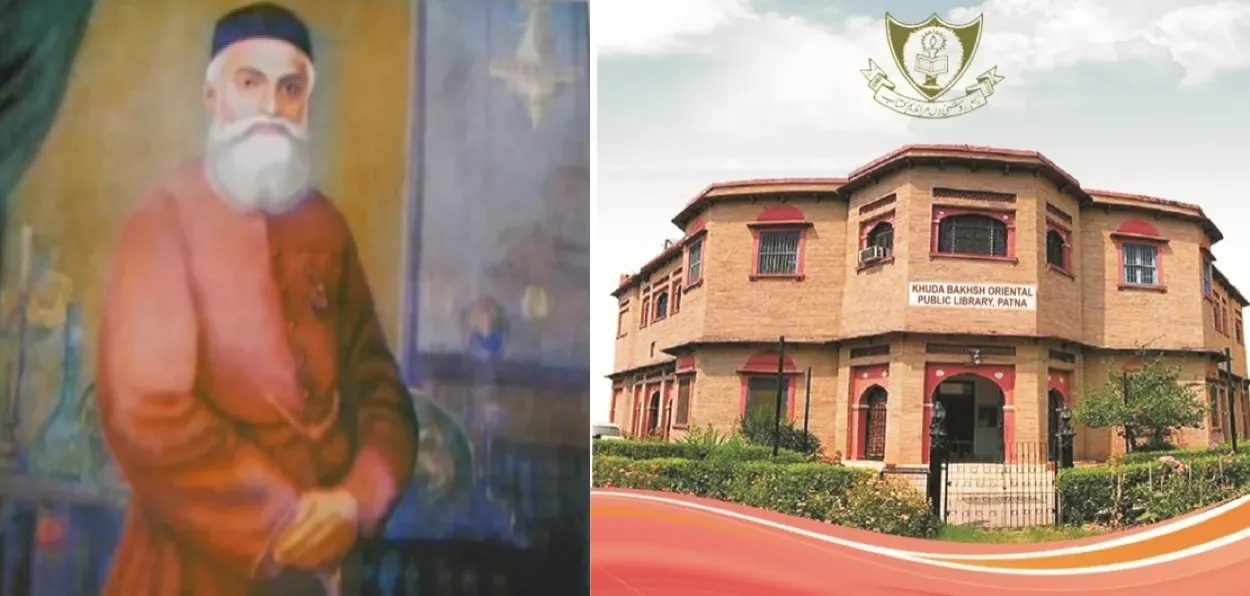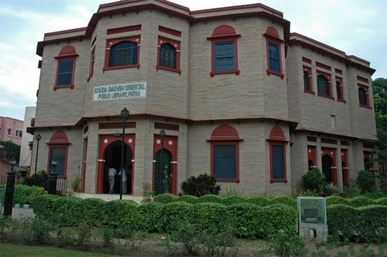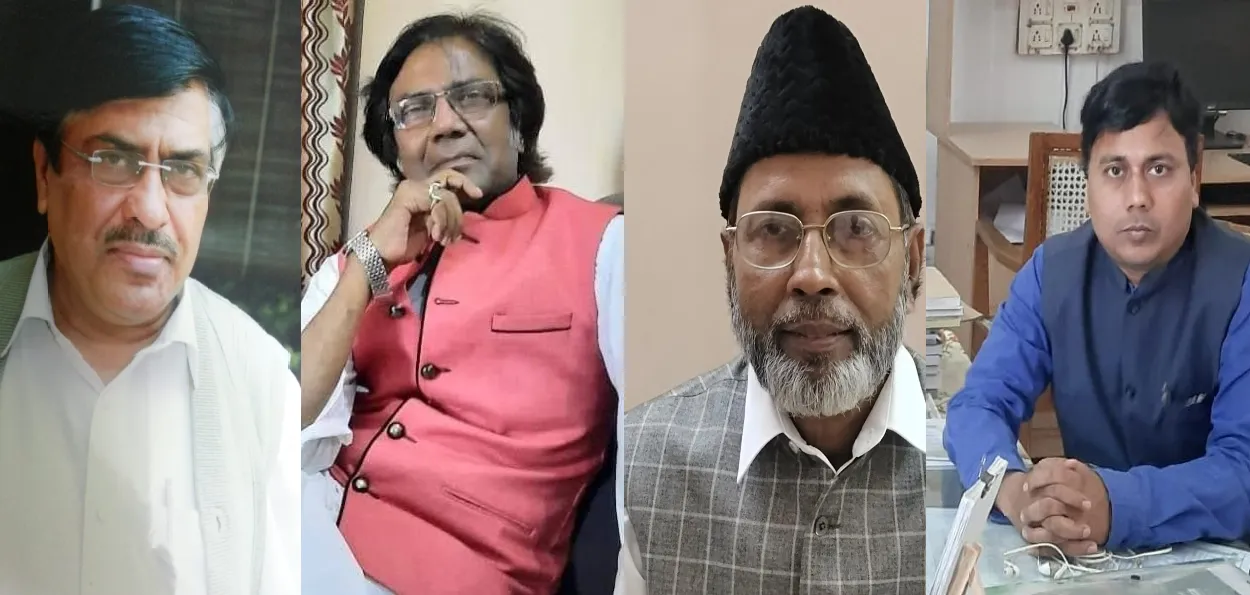
Mehfooz Alam/Patna
Maulvi Khuda Bakhsh Khan was not only a bibliophile but also a social reformer. He hailed from Bihar and today his memory is commemorated through the public library he founded. Today it's known as the Khuda Baksh Library in Patna and is one of the historical places in the city.
Khuda Bakhsh devoted his life, wealth, and property to buying and protecting books. No wonder his efforts today are reflected in the vast repository of more than 2,000 manuscripts in the library. Some manuscripts are rare and much sought after by researchers and historians.
Scholars from different countries come to the library to research the manuscripts of Arabic, Persian, and other languages.
After ruling a vast region of India for some 200 years, the Mughal empire was losing its grip and sheen. At this stage, the books and other literary documents of that era were at risk of being lost. After the revolution of 1857, the personal books of Sultans, Badshahs, Rajas, Maharajas, and Nawabs were scattered. They were the most important documents of Arabic, and Persian, in which much of history was revealed for posterity. This included books on religion, Indian history, authentic documents of kings, and medicine in languages such as Sanskrit, Pali, Pashto, Turkish, Hindi, and Urdu.
 The administrative block of Khuda Bakhsh Oriental Library
The administrative block of Khuda Bakhsh Oriental Library
Khuda Bakhsh Khan made it his life's mission to collect these scattered books. Later, this collection was housed in what is today's the Khuda Bakhsh Oriental Library of Patna, Bihar.
Khuda Bakhsh Khan hailed from the Siwan district of Bihar. He was born in 1842. Khuda Bakhsh Khan inherited his love for books from his father, who had bequeathed his collection of manuscripts and books to him. Khuda Bakhsh Khan's forefathers were courtiers of the Mughal Emperor Aurangzeb. His father was a famous lawyer in Patna.
Khuda Bakhsh Khan also obtained a law degree and started practicing in Patna. He became a famous lawyer and invested all the money he earned in buying and protecting books.
Professor Imtiaz Ahmed, former director of Khuda Bakhsh Public Library and a historian, says that Khuda Bakhsh Khan would do anything to buy manuscripts. "He was passionate about books and spent all his earnings on them. He kept them in his house and opened them to the public".
Prof. Imtiaz Ahmad says that Khuda Bakhsh Khan is an important name in the history of books.
Khuda Bakhsh Khan set up a public library in 1891. The library was inaugurated by the then Governor of Bengal. At the time of its opening, the library contained about 4000 rare manuscripts, but today the number of manuscripts is more than 21 thousand and the books number in millions.
Professor Imtiaz Ahmad says that as long as Khuda Bakhsh Khan continued buying rare manuscripts all his life. He quoted an instance from his life: Once he had a case of murder to defend in a court of law. He went to the then Magistrate and told him about the case. The Magistrate said, "Maulvi Sahib, I know this case will give you good money which you will use well." The magistrate also knew that Maulvi Khuda Bakhsh would buy books with the money.
Prof. Imtiaz Ahmed says that Khuda Bakhsh paid Rs 50 extra to his office assistant so that he could buy manuscripts. However, later during his hard times, he suffered a stroke, and his family was left without any income. At that time, he received many offers for his manuscripts that he resisted despite his impoverishment.
 Academician and poets who spoke to this reporter
Academician and poets who spoke to this reporter
Imtiaz Ahmed says it was an irony of fate that the government offered him Rs 50 as a monthly stipend. In a way, people criticised him for not being pragmatic but everyone respected him.
Khudfa Bakhsh had willed that come what may the books in the library should never be taken out.
Dr. P Feroz Ahmed, Assistant Professor of BN Mandal University, says he would not be where he is today but for the Khudabaksh Library. He completed his research based on resources in the library. "I would like to give credit to the Khuda Bakhsh Library for my research on the social and economic condition of the Muslim community. This library is a great gift of Khuda Bakhsh Khan to the people of Patna."
On Patna's Ashok Raj Path, the Khuda Bakhsh Khan Public Library is one of the City's iconic landmarks. It's a must-visit place for anyone visiting Patna for the first time.
"Any person be he from the area of knowledge, literature, film industry, artist, sports, researcher or a political leader, he first visits Nalanda, (University), followed by the Khuda Bakhsh Library," says, P Feroz Ahmed.
Students of Patna University, Pataliputra University, Magadha University, and researchers from across India and abroad benefit from this library. One can see the library packed with people all day. It has a separate reading room for researchers. Today, all the bigwigs in the government or academia have been associated with God Bakhsh Library.
"I am a lifetime member there so I have a personal connection with this library. I am eternally indebted to Khuda Bakhsh Khan. May Allah give Bakhsh Khan a high place in heaven; his services can never be forgotten."
Urdu writer Aslam Javadan says that Khuda Bakhsh Khan's real name was Maulvi Khuda Bakhsh Khan, he was a great social reformer. He was very serious about bringing educational awareness to every class, especially women's education. Khuda Bakhsh Khan's family was quite educated and the family had a great affinity with education. As a result of this educational interest, Khuda Bakhsh Khan founded a library.
Aslam Javadan says that Khuda Baksh Library is unique in the entire subcontinent in terms of its collection. The scope of Khuda Bakhsh Khan's work is quite wide. Not only did he collect books, but he also tried to improve society and education. The establishment of the library is his greatest achievement.
Nilinshu Ranjan, a poet of Urdu and Hindi, says that without a doubt Khuda Bakhsh Khan is the name of this great personality of Bihar who has given the masterpiece and precious gift to the people of Azimabad which takes centuries to make. He established a library where besides Arabic, Persian, and Urdu there are also rare texts of Sanskrit.
ALSO READ: Ashram in south Kashmir on mission of 'man-making and nation-building’
It is only because of this valuable reserve of God Bakhsh Library that the world is attracted to it. People connected with the field of research come here from all over the world. Under an Act of Parliament in 1969, the central government maintains this library. Apart from the rare drugs of ancient times, such rare things of the Mughal era were collected by Khuda Bakhsh Khan which has no other example.
Khuda Bakhsh passed away on August 3, 1908, leaving a legacy for generations to benefit from.
